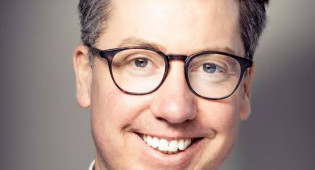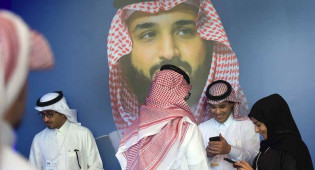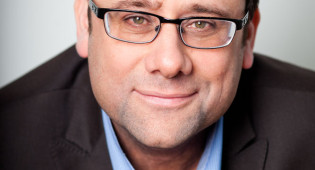
News
Publié le : 25/01/2023
Thomas S. Kaplan : Can Beauty Save the World ?
Dr. Thomas S. Kaplan is an American entrepreneur, civil society actor, philanthropist, environmental advocate and art collector. He has served as Chairman of the International Alliance for the Protection of Heritage in Conflict Areas (ALIPH) since 2017.
ALIPH is the result of a joint initiative formed by the President of the French Republic at the time, François Hollande, and the then Crown Prince (now President) of the United Arab Emirates, Sheikh Mohamed bin Zayed Al Nahyan. It also follows UN Security Council Resolution 2347 on the protection of cultural heritage at risk.
In addition to these roles, Thomas Kaplan is the Chairman of investment and asset management firm The Electrum Group LLC; former President and Board Chair of the 92nd Street Y, Manhattan’s premier cultural and community center; Co-founder and former Executive Chairman of Panthera, the global leader in wild cat conservation; and, together with his wife Daphne, Co-founder of The Leiden Collection, the world’s largest private collection of Rembrandt and Dutch Golden Age art. He is also a member of the Council on Foreign Relations and the International Council of the Belfer Center for Science and International Affairs at Harvard University. In 2014, Kaplan was awarded the rank of Chevalier in France’s National Order of the Legion of Honour. He was promoted to the rank of Officier in 2020.
Dr. Kaplan accepted the invitation of the Newsroom to discuss the role of the ALIPH Foundation in the stabilization and pacification of conflict zones and, more broadly, that of cultural diplomacy in an ever more multipolar world.
First of all, as you know, in late October, Vladimir Putin declared martial law in the annexed Ukrainian territory. He also explicitly legalized the plundering of the region’s cultural heritage in the name of preserving the works. Late March, the Getty Foundation had denounced the destruction of Ukrainian museums and monuments and warned that cultural heritage is all too often a target during war and conflict. What’s your opinion today about this requisition of the Ukrainian works? And how did ALIPH mobilize in Ukraine to protect this heritage?
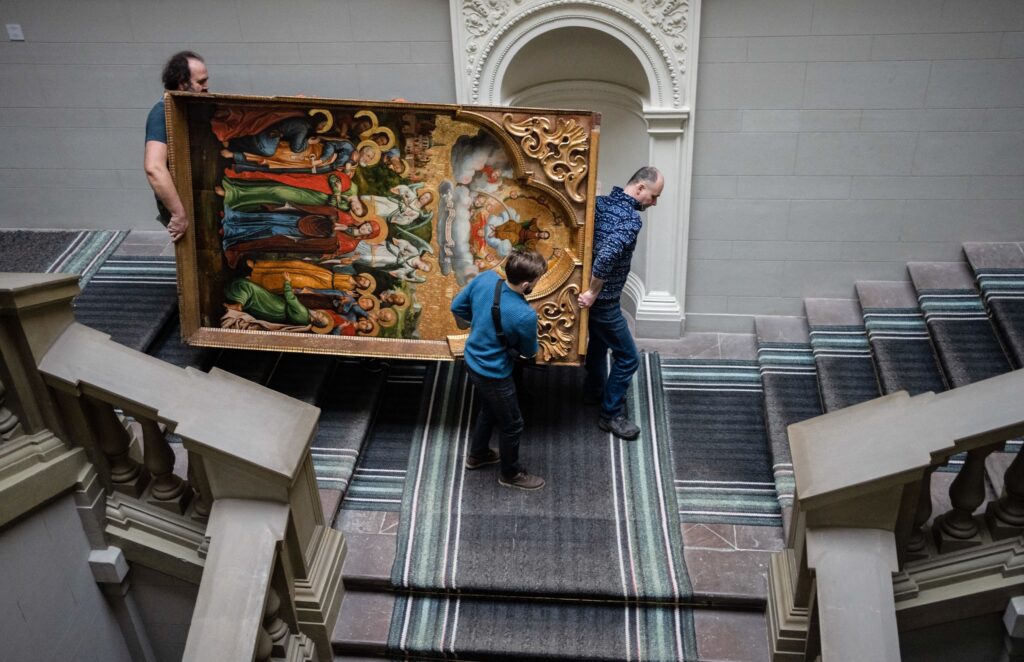
I’m very proud to say that the performance of ALIPH in Ukraine has been exemplary. In many respects, it crystallized precisely why ALIPH needed to be created. It proved that ALIPH’s « raison d’être » was not only valid, but that it could be considered to be a gold standard in terms of rapid reaction to threats to cultural heritage as a result of being in conflict zones. What does that mean in practical terms? From the 24 February, ALIPH was on the ground probably faster than any other organization in the world, and was ready to assist the Ukrainians in being able to deal with the collateral damage of the war to their cultural heritage.
In real terms, this meant protecting, securing, maintaining and, in some instances — and this will obviously become a more important aspect — repairing the heritage which has been threatened and damaged by the Russian aggression. Theft of Ukrainian patrimony by Russia actually sets a disturbing precedent — at least in the post-war world. Whereas this was the modus operandi, for example, of the Nazis to seize cultural heritage, to seize artworks, to extort paintings, antiquities in conquered territories, this was not really the norm in the last century. It was the norm during the imperial era. So, in the 19th century you saw many countries, France included, who would cart off booty and plunder and repatriate it back to Paris, London, Berlin or wherever. But we came to understand that this is not something which we should be doing in the modern era. There are some things which were standard practice in ancient times, or even up until the 20th century. But then, after that, it’s assumed not to be standard practice. We live and we learn. There was slavery, and now we consider slavery bad. A lot of Western civilization was built on slave societies — Greece, Rome — but we obviously no longer do that now.
« This seemed to be the product of a bygone era »
Some things simply are not meant to be done. The idea that one can conquer a territory and then seize those assets, and nationalize them, is a throwback to a different era. But let’s also be very open about this. The kind of naked aggression which was and is being perpetrated by the Russians on Ukraine is itself meant to be a throwback to a different era. There are reasons why this is being referred to as the greatest crisis in Europe since the Second World War — because up until February 24, people didn’t think that this was going to happen again. They weren’t prepared for it. Intellectually, this seemed to be the product of a bygone era.
Most of our activities are not in Europe. ALIPH is now present in more than 35 countries, supporting well over 100 projects around the world. And of course, there is now Ukraine too. I don’t think anybody expected, when ALIPH was created, that we would be in a situation where we have such a catastrophe in Europe — according to UNESCO and as of December 22nd — of 231 cultural sites, 100 religious’ sites, 20 museums, archives, libraries.
And this is the agenda of Russian army in Ukraine?
Who knows what the agenda is of the Russian army in Ukraine? If somebody had told you that the Russian army would perpetrate the atrocities at Bucha, would you have believed it? You would have said that in today’s Europe, it’s not possible.
If you look at the way that we’ve reacted, and Ukraine is a frighteningly ominous real-time example, the hundreds of disbursements that we’ve made all across the board — the work that we’ve done in tangible and even intangible heritage — is altogether emblematic of “The ALIPH way”. The ALIPH Way was an expression that was coined by H.E. Mohammed Al Mubarak, our Vice-chair, which really crystallizes the concept that we’re not going to be burdened by bureaucracy. If there’s a need, we will act and set to work immediately. And we do so, as I said, almost on a daily basis. We are approving disbursements to Ukraine within hours, to meet requests that other organizations might take weeks or months to vet and approve.
Almost a year ago, the former French Minister of Europe and Foreign Affairs, Jean-Yves Le Drian, unveiled to his advisors of cooperation and cultural action the new “roadmap of influence”. The issues related to cultural diplomacy seem to evolve to tend today towards a changing semantics, moving from cultural “rayonnement” to cultural “influence”. Do you think this change of doctrine is necessary? And how can organizations like yours contribute to it in order to promote a model of liberal democracies that is experiencing a crisis at the moment?
At the end of the day, when you’re talking about conflict, you’re talking about a breakdown of the conception that, through conciliation and diplomacy, a problem can be resolved without force. It is a determination, consciously or unconsciously, that what divides us is more powerful than what unites us.
I have great affection for Jean Yves, who is right to see a transition from the pure concept of preserving cultural heritage because it’s the right thing to do — or let’s say “cultural diplomacy” because it’s the right thing to do — to being able to see it as an element of soft power and influence. This is legitimate. I encourage it. I encourage more countries to do it. It’s one of the reasons why France has a relative advantage in the world. There is nothing cynical about doing well by doing good. And there’s nothing wrong with it. It’s a more cartesian approach, but it’s perfectly legitimate.
There is a feeling in many parts of the world that culture is not just soft power, but just soft. That it’s unnecessary, that it’s difficult to determine impact, that it’s somehow effete and elitist. That view is so wrong. At the end of the day the present generation simply does not have the right to pass to future generations a diminished cultural endowment. They don’t have the right anymore, when you’ve had hundreds, if not thousands of years of cultural heritage being maintained or just surviving, not to pass it on in at least as good a condition as the way you found it. As the incumbent generation also does not have the right to pass on a deteriorating and declining biodiversity to future generations. We just don’t. We’re given these cultural and environmental endowments and it’s our duty to protect them — in an ideal world, we restore them too, we renovate them and we pass them on in better condition than when we found them. That’s aspirational. To protect heritage, at the end of the day, comes down to protecting beauty literally, but also figuratively.
« When, throughout the broad sweep of history, did beauty save anything? »
So philosophically, I take a lot of inspiration, sometimes consolation, from a commentary that Aleksandr Solzhenitsyn made when he accepted the Nobel Prize in 1970. Considering the lens through which he viewed history, the author of The Gulag Archipelago can easily have been unadulteratedly cynical about the trajectory of mankind. And he made a very interesting observation, probably the most interesting observation about beauty that I’ve ever heard. Let me emphasize for the record, he was Russian. Now, he commented, he said, “when I came across the statement by Dostoyevsky that beauty can save the world, I asked myself, when, throughout the broad sweep of history, did beauty save anything?”
I’m paraphrasing, but he asked when, in the catalogue of human crimes and horrors visited upon fellow humans, did beauty save anyone or anything? And then he reflected that there is in art a “special status”, a holy trinity of truth, goodness, and beauty, and that perhaps it’s possible that when truth and goodness are crippled or eliminated, what’s left is beauty and that in itself it can do the work of all three. And as he put it, when he absorbed that, he understood that what Dostoyevsky had said was not just a casual and flippant sentence, but had within it a sense of prophecy — for in its conception lies a recognition that the preservation of beauty, broadly defined, matters not because all cultural heritage is aesthetically beautiful. That’s not the point. But because the beauty of our common humanity has to be preserved.
The twist that is “The ALIPH Way” is that we take that mission as being immediate, that it isn’t about studying the problem to death. It’s about recognizing the challenge and going in as fast as possible to be able to mitigate the consequences of those relative crises. Sometimes you don’t really need to study too hard to understand what you have to do. It becomes common sense. Alas, as Voltaire put it, “common sense is not so common”. Which is why I am so proud about what Valéry and his team, and the Foundation’s Board, have accomplished at ALIPH. The proof is that I can’t tell you how many times I’ve had people of multiple nationalities come up to me and said “ALIPH was for us the difference between night and day, life and death”.
You made the perfect transition with the next question because I was about to ask you about the inclusion of “The ALIPH Way” in building peace today. Because actually all the international leaders are looking for solutions, but powerful solutions and different ways of achieving results. How would you consider ALIPH in this global thinking about building peace and sharing shared principles and values today? Because, different continents, different cultures, different priorities, all the global changes, global warming, when you go to Africa and go to Asia, go to South America, all the people that have different views about it and still, at the end the day, we all share the same planet. How can “The ALIPH Way” be an example, a tool, a solution? And how would you consider it in this global reflection, global thinking, about shared principles, common values?
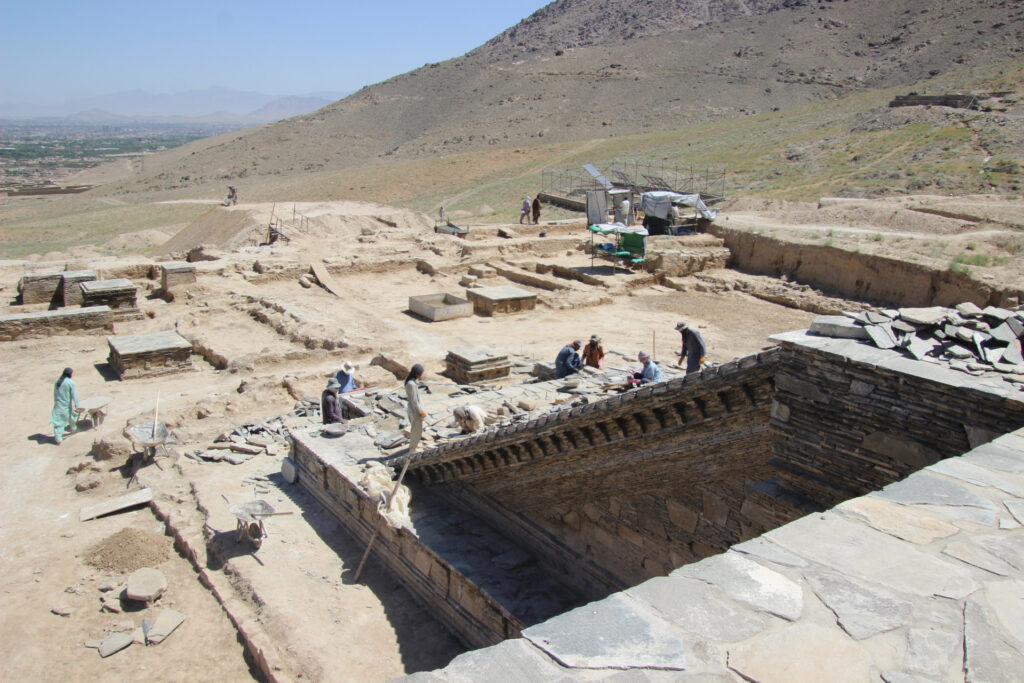
The fact that we have shared principles and values with many organizations, cultural organizations around the world, is a given. It’s self-evident. The distinction is the passion that is evidenced by the speed with which we react. There is not just an intellectual imperative at work. I think that one of the things that characterizes the perception of ALIPH’s success is our responsiveness. The responsiveness I’ve seen with my own eyes seems to tell people you care. That’s not to say that any of the organizations that are engaged in this don’t care. By definition, they do. All of these people who work for these organizations in some ways are saying we want to do something with our lives that is bigger than us — that we embrace the concept that it is our job, our duty, our responsibility to pass on these legacies to future generations. That’s why we work so well with partners. We share those common values and we share those common interests. To the extent there’s a difference, it’s that we say, “okay, that took two minutes. We share common interests, we share common values…now, let’s get this done. Not tomorrow, now.” As I promised President Macron and Sheikh Mohamed bin Zayed when they gave me a mandate, what they would see is “Action, action, action!”
« We don’t have time »
That’s what people are looking for. What they’re looking for is a very old concept. During the First World War, the British had an expression “deeds, not words”. And eventually people get around to doing these things. We do not accept the concept that says, “OK…we had a great conference. We have these objectives, now what are we going to do today?” No, it’s very much the concept of “that was excellent work, you did a great job. Now what have you done for me in the last 3 hours?” That’s our attitude. Our attitude is, so long as there are conflicts, we don’t have time. Now, what’s the program. Now, today, when you get out of bed and you open your eyes, what is your agenda? And when you close your eyes at night, what do you know that you’ve accomplished? Because we don’t have time. And that’s very fortunate for us because, I’m very sad to say, we operate in a “growth industry”. The conflict industry is a growth industry — and there’s no part of the world that is immune to it. It affects not just the developing world, but the developed world too… all over.
It’s a perfect transition because just before our last question about Iran, we want to know more about your deep conviction regarding this international cooperation to prevent conflict. So, the geopolitical divide comes after the COVID-19 pandemic that has considerably increased global inequality between the North and the South, making, among other things, the safeguarding of heritage even more difficult. You have always pleaded for dialogue between civilizations in order to prevent latent conflicts and to promote cooperation. So, what should this dialogue be based on?
I am not a pacifist. I believe that there are things worth fighting for — that there are things worth dying for. And I do believe that fundamentally, because we’re dealing with human nature, we must have a balance of power that deters aggression. When that fails, or when it’s challenged, is when our common cultural inheritance, our common humanity, has the chance to be the wedge that prevents us from going to the dark side. In a way, that’s what Solzhenitsyn meant when he said that, when truth and goodness are gone, beauty can fill the void left by their absence. So, what I’m giving you in that answer is a dichotomy. I do believe there is a difference between good and bad, right and wrong. I do believe in truth. I do believe in goodness. And I believe in fighting for both of them. I certainly would rather die on my feet than live on my knees.
« Brothers and sisters can fight, and fight really hard »
But I also believe that the kinds of things that we do, the kinds of things that UNESCO does in declaring World Heritage Sites, is a constant reminder that we are bound by a genetic inheritance. We’re all, at the end of the day, brothers and sisters. But don’t get me wrong, brothers and sisters can fight, and fight really hard. And there is a reason why civil wars are often the bloodiest — because the level of disappointment is greater when you actually feel that the other side has let you down. The hatred is far greater than when you see it as a function of a conflict of interest, conflict of values, which leads you into a much more Manichaean world. So, what cultural heritage does is it reminds us of these common values and, in so doing, it has the ability, in a sense, to reboot the subconscious and alert it that descending into barbarism is not in anyone’s interests because, over the long term, history will judge you very, very badly.
So according to you, before the dialogue, we should fight to defend those values?
Of course. And maybe someone would expect that I would say that some things aren’t worth dying for, that we have to think of what is immediately before us. But I don’t believe that that’s the case. I think that good fences make good neighbors. And good fences backed by people understanding that these are their boundaries are a good thing. But once those boundaries are crossed, that’s when we kick in. That’s why I say, unfortunately, we’re in a growth industry. Every generation goes through wars and people look back at it and say: what were they thinking? In 1914, things were better in the world than they’d ever been. And these people flocked to the trenches and to the front lines. What were they thinking? What are we thinking today when we see what we’re seeing in Ukraine and where it can lead, in the blink of an eye, as this war can be expanded. If a missile goes off track, hits something else, this war can be expanded. And people will look back and say, “what were they thinking?”
When you see the reaction of the Iranian population, and specifically the women, you see the gap between people ready to die for their ideas, for their values, for their freedom, compared to, say, what we experience in France, for instance, or Western countries more generally, where we are far, far, far from understanding the cost of peace and the cost of freedom. This might well be an impossible question, but according to you — and taking into consideration the realities of present day Iran — between opening a dialogue with the regime or backing the forces of the revolution, what could be a path to achieving what you aspire to with ALIPH? And how could ALIPH serve as a possible inspiration to the situation in Iran today?
It’s not ALIPH’s business to involve itself in Iranian politics any more than we involve ourselves in the politics of any of the countries in which we engage. By definition, we are engaged with national and provincial and local leaders and communities in every country in which we operate. But we do not have a mandate to try to help any constituencies to find a common ground. It’s not our business. And when that becomes our business, it will almost certainly result in us having to exit the country because we can’t be picking winners and losers. The fact that we are apolitical is extremely important. We protect Persian cultural heritage outside of Iran. The Ctesiphon Arch in Iraq, for example, is an absolutely magnificent example of Iranian architecture. But we are mindful of the fact that there are certain countries in which we can’t operate. Iran is one of them…which is a huge pity as I am in fact a Persophile. For years, I would get questions about why, given my clear passion for building bridges between cultures, for arguing against nationalism, for promoting tolerance and humanism, I could be opposed to Iran or dialogue with Iran. And the short answer to that is I am not at all opposed to dialogue with Iran.
« Chamberlain would have been a hero and Churchill would probably be best known for some very mediocre watercolors »
I don’t believe in non-communication as a strategy. I’m not opposed to dialogue with Russia. I wouldn’t have been opposed to a meeting between Chamberlain and Hitler at Munich. As Churchill would say, you don’t make peace with friends, you make peace with enemies. The best way to make peace or to find common ground is face-to-face. It’s not who you meet, it’s not who you talk to: it’s what you tell them and then what you do. If Chamberlain had told Hitler that the Sudetenland was a red line, that would have changed everything. And instead of him being remembered as an appeaser, and Churchill as the greatest Brit — not just of his generation, but in popular culture for all times — Chamberlain would have been a hero and Churchill would probably be best known for some very mediocre watercolors. So, it’s not who you meet. It’s not about not talking with the devil. It’s about looking the devil in the eye and saying: “you will not take my soul beyond this. I will not allow it”. There are those who say that Chamberlain bought time. But the fact was the Czechs were the most liberal country in Eastern Europe, the most advanced, and had the most defensible boundaries, and we should have stood firm.
« The regime has shown its true nature and those who were arguing or defending them in the west are turning their back on them »
And I point this out, and I’ve been pointing this out to people for years: you do not have to be anti-Iranian to understand that this regime is an aberration in Iranian history. So, one thing we know is that nothing is static but also that nothing is new under the sun. The clerical government, Velayat-e faqih, will ultimately pass away. And my sense is that, one day, Iran will have a truly democratic political system. My own personal experience, as a student and an admirer of Iranian history who has been deeply opposed to this regime, is that I do not have to explain to people the nature of the regime any longer. Because the fact is that you can’t blame these troubles on neoconservatives or Trump or even politics or human rights issues now. Simply put, a regime that kills its own women and children shows its true face. And that is the significance of what began in Kurdistan and has spread to the rest of the country. The regime has revealed its cynical nature, and those in the West who were defending them and even arguing actively for the regime, are turning their backs on it. It’s about time. Women, Life, Freedom!

